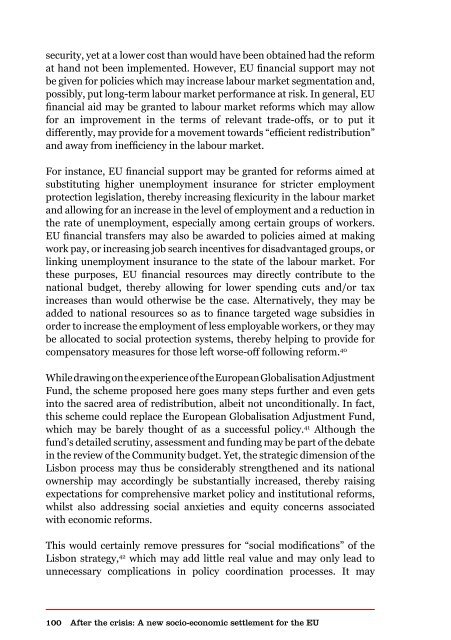Authors Iain Begg | Gabriel Glöckler | Anke Hassel ... - The Europaeum
Authors Iain Begg | Gabriel Glöckler | Anke Hassel ... - The Europaeum
Authors Iain Begg | Gabriel Glöckler | Anke Hassel ... - The Europaeum
Create successful ePaper yourself
Turn your PDF publications into a flip-book with our unique Google optimized e-Paper software.
security, yet at a lower cost than would have been obtained had the reform<br />
at hand not been implemented. However, EU financial support may not<br />
be given for policies which may increase labour market segmentation and,<br />
possibly, put long-term labour market performance at risk. In general, EU<br />
financial aid may be granted to labour market reforms which may allow<br />
for an improvement in the terms of relevant trade-offs, or to put it<br />
differently, may provide for a movement towards “efficient redistribution”<br />
and away from inefficiency in the labour market.<br />
For instance, EU financial support may be granted for reforms aimed at<br />
substituting higher unemployment insurance for stricter employment<br />
protection legislation, thereby increasing flexicurity in the labour market<br />
and allowing for an increase in the level of employment and a reduction in<br />
the rate of unemployment, especially among certain groups of workers.<br />
EU financial transfers may also be awarded to policies aimed at making<br />
work pay, or increasing job search incentives for disadvantaged groups, or<br />
linking unemployment insurance to the state of the labour market. For<br />
these purposes, EU financial resources may directly contribute to the<br />
national budget, thereby allowing for lower spending cuts and/or tax<br />
increases than would otherwise be the case. Alternatively, they may be<br />
added to national resources so as to finance targeted wage subsidies in<br />
order to increase the employment of less employable workers, or they may<br />
be allocated to social protection systems, thereby helping to provide for<br />
compensatory measures for those left worse-off following reform. 40<br />
While drawing on the experience of the European Globalisation Adjustment<br />
Fund, the scheme proposed here goes many steps further and even gets<br />
into the sacred area of redistribution, albeit not unconditionally. In fact,<br />
this scheme could replace the European Globalisation Adjustment Fund,<br />
which may be barely thought of as a successful policy. 41 Although the<br />
fund’s detailed scrutiny, assessment and funding may be part of the debate<br />
in the review of the Community budget. Yet, the strategic dimension of the<br />
Lisbon process may thus be considerably strengthened and its national<br />
ownership may accordingly be substantially increased, thereby raising<br />
expectations for comprehensive market policy and institutional reforms,<br />
whilst also addressing social anxieties and equity concerns associated<br />
with economic reforms.<br />
This would certainly remove pressures for “social modifications” of the<br />
Lisbon strategy, 42 which may add little real value and may only lead to<br />
unnecessary complications in policy coordination processes. It may<br />
100<br />
After the crisis: A new socio-economic settlement for the EU

















